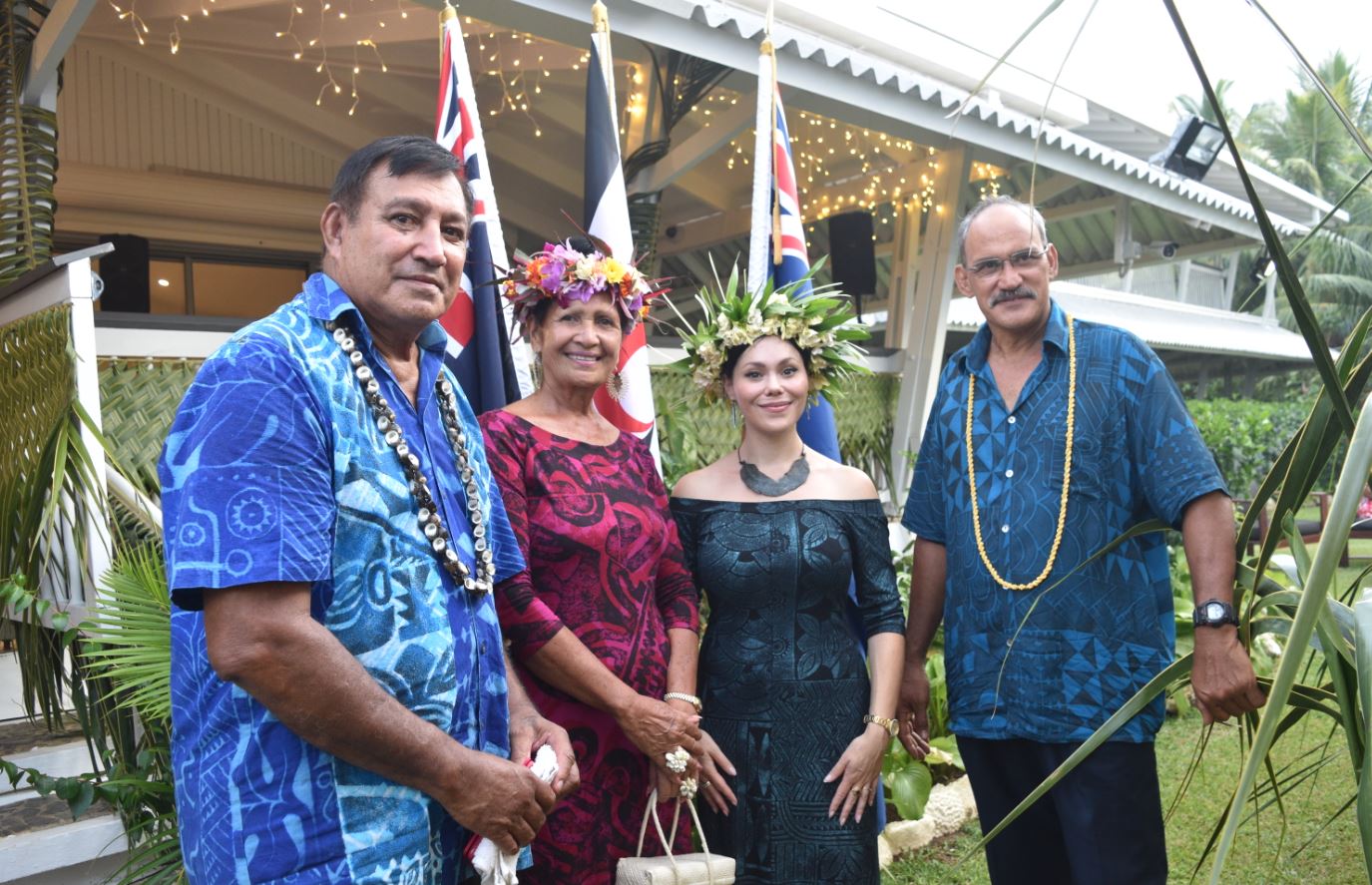Commemorating Te Tiriti o Waitangi
Wednesday 8 February 2023 | Written by Melina Etches | Published in Culture, Local, National

King’s Representative Sir Tom Marsters, Lady Tuaine Marsters, New Zealand High commissioner Tui Dewes and acting DPM Minister Vaine (Mac) Mokoroa. 23020710
February 6, marks the day Aotearoa New Zealand’s founding document, the Treaty of Waitangi or Te Tiriti, was signed in 1840.
Aotearoa New Zealand High Commissioner Tui Dewes hosted Monday evening’s Waitangi Day event at Ngātipā to commemorate the 183rd anniversary.
Formalities opened with a “pao” or chant by Dewes and the New Zealand High Commission staff which was composed by Bill Hohepa, and spoke of how the intent of Te Tiriti had not always been honoured.
Following are extracts from Dewes speech.
“Te Tiriti essentially saw Māori agree to share Aotearoa with the British Crown, with more than 500 Māori rangatira signing Te Tiriti over the course of 1840. But this was by no means all rangatira. Many, including my own tipuna, chose not to sign.
“Those Māori who did sign, had high hopes that te Tiriti would do as it had promised; protect their Tino Rangatiratanga, or sovereignty, over their lands, fisheries and other treasures,” stated Dewes.
But this, unfortunately, hasn’t always happened.
In fact, breaches of Te Tiriti began the same year it was signed, and actions taken by successive governments since, have resulted in a loss of Māori land, the demise of the Māori language and a decline in Māori economic, social and cultural well-being, said Dewes.
“The strengths and achievements of Aotearoa have been born out of the diversity represented in our Treaty partnership - by all of us working together we have created the country we are today.
“A country that has been made all the more vibrant by Cook Islanders, including the more than 80 000 who currently live in Aotearoa, and who I know have contributed a great deal over the years, economically, politically, socially, and culturally.”
Since the Treaty was signed in 1840, a lot has been said about it.
Dewes particularly loved what had been said by New Zealand author, and former diplomat, Witi Ihimaera.

Mere Taripo, Maryanne Short, Minister Albert Nicholas and Makea Karika George Ariki. 23020719
“He has said that we should be thankful for Te Tiriti, because it is, historically speaking, a courageous document, which has provided a basis for us to have a discourse on the future of Aotearoa.
“If it wasn’t for Te Tiriti – we wouldn’t have been able that conversation, and to have achieved all we have in terms of redressing wrongs, including through the Waitangi Tribunal.”
Dewes specifically acknowledged one of the Waitangi Tribunal members Derek Fox, who is also President of the Aotearoa Society in the Cook Islands. “E mihi nui ana ki a koe, Derek, mo to mahi rangatira.”
She acknowledged an “important kuia” who dedicated her life to championing Te Tiriti, and who sadly passed away just over a week ago Titewhai Harawira from Ngāpuhi.
Dewes stated: “For me personally, I see Te Tiriti as greater than the sum of its parts. It really is a treatise for good justice and good representative, consensual government. As Witi Ihimaera has so poetically said: “there is a sympathy, a wish and a dream embedded in Te Tiriti”, and you can see many of the wonderful things it says operating in Aotearoa today.
“Today, the principles of Te Tiriti are woven into much of what our government seeks to do. Indeed, early in her term as our Foreign Minister, the Honourable Nanaia Mahuta spoke about how the principles of partnership and mutual respect embodied in Te Tiriti provide the foundation for how Aotearoa conducts our foreign policy.”
This includes the engagement with the Cook Islands.
Aotearoa’s Minister Mahuta has especially close whakapapa ties to the Cook Islands, she undertook her first official visit here late last year.
“As a lasting legacy, her time here culminated in the signing of our statement of partnership, Waka Hourua/Vaka Purua,” said Dewes.
In terms of the immediate future, Aotearoa remains keen to continue partnering closely with the Cook Islands, including the economic recovery; improving education and health outcomes, and the delivery of resilient infrastructure, said Dewes.
“We are very much looking forward to the year ahead, including to the Cook Islands’ hosting of the Pacific Islands Forum later this year, which we know will be a success,” said Dewes.
“No reira, hei whakakapi ake i roto i te ngakau whakaiti, tēnā koutou, tēnā koutou, tēnā tātou katoa. Meitaki ma’ata e kia manuia.”
Acting Prime Minister Vaine (Mac) Mokoroa and Kings Representative Sir Tom Marsters also delivered speeches at the Waitangi Day occasion.
In his speech Mokoroa stated that many ancestors of New Zealand Maori cousins, passed through Rarotonga on their voyages to Aotearoa, many hundreds of years ago.
“Cook Islanders are New Zealand citizens, and we travel on New Zealand passports and many thousands of Cook Islanders live and work in New Zealand,” he said.
Since World War One, men from the Cook Islands have served alongside Kiwi soldiers, sailors and airmen, in wars and conflicts around the world; for over a hundred years through to the present day.
“So we have a shared history, shared ancestry, and we’ve shed blood together.
“We may not have been signatories to the Waitangi Treaty, but I feel it covers us too. We too have obligations and enjoy the benefits it bestows,” said Mokoroa.














































